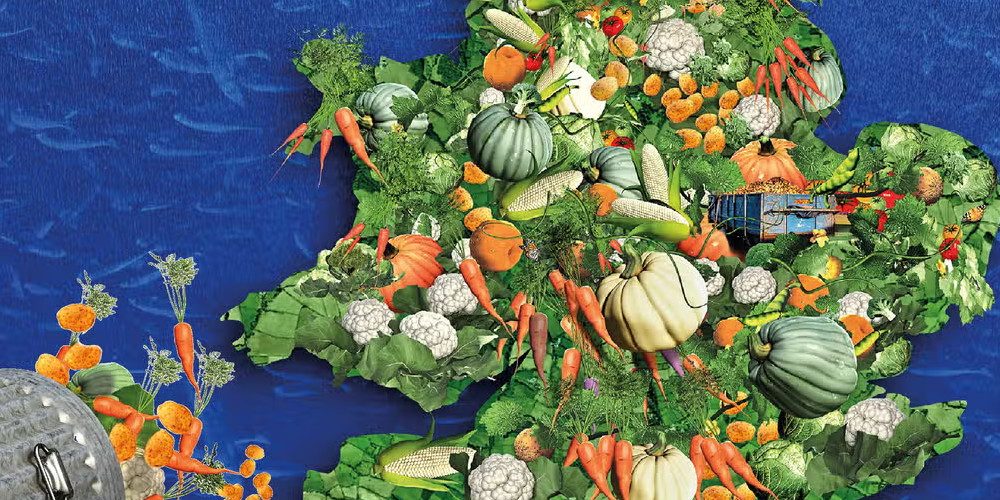Food waste was front cover news yesterday in the Evening Standard, which published a spread on last year’s report by WWF about how much food is wasted on farms. It is great to see food waste gaining more attention in influential spaces. But there were some elements in the article, and in a campaign announced by King Charles last week, that mischaracterised the root problems of food waste and are in danger of encouraging overproduction as a solution to poverty while failing to meaningfully confront either.
The article gets off to a bad start by positing that waste on farms is ‘inevitable’ due to overproducing food and the cosmetic standards imposed on fruits and vegetables. As recognised by food charity Feedback, these examples are nowhere near inevitable and are the product of a food system that pressures farmers into overproducing food to meet strict supermarket standards and a culture of oversupply.
The proposed solution by the paper and the newspaper’s proprietor Evgeny Lebedev in an accompanying editorial is to redistribute excess food to low-income communities and the increasing number of families in the UK who face food insecurity; in essence, that food waste should be a solution to poverty.
Some arguments in the paper were welcome, such as that sending food waste to anaerobic digestion incentivises farmers to overproduce food for the sake of burning it, and government money should be allocated to funding solutions instead. But they did not consider that diverting food waste to food banks and similar organisations incentivises the need to overproduce food too. The article and editorial furthermore failed to deliberate why there are so many food insecure people in the country, and what policies could address the increased need for food banks at all.
There seems to be an increasing pattern of wealthy individuals taking an interest in food waste as a solution to poverty. Last week the Telegraph reported that King Charles will launch a program in the autumn to ‘bridge the gap between food waste and food need’.
Announced as ‘a “significant” national project’, the initiative plans to work ‘with farmers, supermarkets and food redistribution charities’ to ‘ensure edible surplus food and waste produce that is normally thrown away goes to charities supporting those in need or is reused’.
Researchers and campaigners have made it clear that diverting overproduced food to low-income communities does not solve poverty nor the root causes of food waste. Some say it absolves the government of responsibility for meaningfully addressing poverty in the country. This approach moreover justifies continuing to grossly overproduce food. Distinguished expert bodies like the British Medical Journal urge that ‘“leftover” food for “left behind” people will neither address the underlying cause of a person’s need for charitable food aid nor reduce levels of surplus food’. Even influential food banks like the Trussell Trust, although relying on redistributed food, argue that they should not exist at all.
There is no denying that food banks and other food redistribution charities are a critical lifeline for many people that alleviate immediate needs on the spot. Indeed, my blog’s resident artist Erin Chapman is selling our ‘wonky food’ illustrations with 20% of proceeds going to local food banks. But if campaigns to solve food waste and hunger hold food banks in one hand, they need to hold longer-term solutions in the other. Much more attention is needed on changing the conditions that enabled food waste and food insecurity to thrive in the first place, especially from those who have the power to make the most difference.
Systemic changes can include simple measures like scrapping ‘best before’ date labels, dropping aesthetic standards and changing business practices in supermarkets and the hospitality sector. Rethinking the ways in which objects are designed, like my project on the fridge, will also help. More robustly, it means policy measures like mandatory reporting of food waste for all food businesses, including farms. Knowing the scale of the problem and where food waste happens in the supply chain is crucial for finding solutions.
Meanwhile, diverting overproduced food to low-income communities is comparable to touting carbon capture as a solution to climate change – it does not tackle the root of the problem, but is very popular with those who are hesitant to change the system that created the problems we currently face.
While more attention on food waste in the public sphere is welcome, there is a real concern that if co-opted by individuals with lots of resources but inadequate insight into the complexities of the problem, and no real incentive to change the system, proposed solutions will take us down the wrong path and let the government and large businesses off the hook. If Evgeny Lebedev and King Charles are serious about reducing food waste in the UK, I hope they will consider redistributing their money and influence towards systemic solutions.
